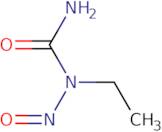1-Ethyl-1-nitrosourea
CAS: 759-73-9
Ref. 3D-FE74952
| 1g | Ausgelaufen | ||
| 2g | Ausgelaufen | ||
| 5g | Ausgelaufen | ||
| 10g | Ausgelaufen | ||
| 25g | Ausgelaufen |
Produktinformation
- 1-Ethyl-1-nitrosomocovina
- 1-Ethyl-1-nitrosomocovina [Czech]
- AENH [German]
- ANH
- ANH [German]
- Aenh
- Aethylnitroso-harnstoff
- Aethylnitroso-harnstoff [German]
- Brn 1761174
- Carbamide, N-ethyl-N-nitroso-
- Mehr Synonyme anzeigen
- Ccris 302
- ENU
- Ethyl nitrosourea
- Ethylnitrosourea
- Hsdb 5111
- N-Aethyl-N-Nitroso-Harnstoff
- N-Ethyl-N-nitosourea
- N-Ethyl-N-nitroso carbamide
- N-Ethyl-N-nitroso-urea
- N-Ethyl-N-nitrosoharnstoff
- N-Ethyl-N-nitrosourea
- N-Ethyl-N-nitrosouree
- N-Ethylnitrosourea
- N-Nitroso-N-ethylurea
- N-Nitrosoethylurea
- N-etil-N-nitrosourea
- NE-Urea
- NEU
- Nitrosoethylurea
- Nsc 45403
- RCRA waste no. U176
- RCRA waste number U176
- Urea, 1-ethyl-1-nitroso-
- Urea, N-ethyl-N-nitroso-
1-Ethyl-1-nitrosourea (ENU) is a nitrosating agent that forms stable complexes with DNA. It is used as a cross-linker in the laboratory to study the effects of chemical stability on DNA. ENU has been shown to induce cancers and leukemia in experimental animals, but not in humans at low doses. In vitro experiments have shown that ENU binds to human liver cells, which may be due to its ability to form stable complexes with DNA. 1-Ethyl-1-nitrosourea has also been shown to cause mutations in spermatozoa and plasma glucose levels, both of which are indicators of cancer risk. This agent does not cause cataracts or skin lesions in animals at high doses, nor does it inhibit the activity of catalase when administered intravenously.





